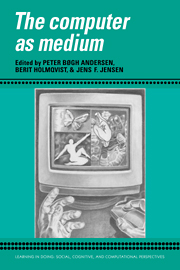Book contents
- Frontmatter
- Contents
- Series foreword
- Preface
- Contributors
- Part I Computer-based signs
- Part II The rhetoric of interactive media
- Part III Computers in context
- Introduction
- 13 Computer culture: The meaning of technology and the technology of meaning
- 14 One person, one computer: The social construction of the personal computer
- 15 Hi-tech network organizations as self-referential systems
- Comment: Disturbing communication
- 16 Dialogues in networks
- 17 Historical trends in computer and information technology
- Comment: The history of computer-based signs
- 18 A historical perspective on work practices and technology
- 19 Hypertext: From modem Utopia to post-modem dystopia?
- Index
Introduction
Published online by Cambridge University Press: 05 October 2010
- Frontmatter
- Contents
- Series foreword
- Preface
- Contributors
- Part I Computer-based signs
- Part II The rhetoric of interactive media
- Part III Computers in context
- Introduction
- 13 Computer culture: The meaning of technology and the technology of meaning
- 14 One person, one computer: The social construction of the personal computer
- 15 Hi-tech network organizations as self-referential systems
- Comment: Disturbing communication
- 16 Dialogues in networks
- 17 Historical trends in computer and information technology
- Comment: The history of computer-based signs
- 18 A historical perspective on work practices and technology
- 19 Hypertext: From modem Utopia to post-modem dystopia?
- Index
Summary
While Part I of this volume presents semiotic approaches to design and analysis of computer systems, focusing on the internal workings of the machine and the computer-based signs, and Part II deals with interactive composition and aesthetic form, especially the aesthetics and rhetoric of interactive fiction, focusing on man-machine interaction, interface-design and the concept of interactivity, Part III is devoted to the analysis of computers in context. In taking up computers in this perspective, we are seeking to discuss a set of issues on yet another level of concern – those wider social, cultural, historical, and organizational conditions and circumstances within which computers and the use of computers are located and made meaningful. The term context thus serves to direct attention, on the one hand to the conditioning forces and frames that constitute and regulate the production, circulation and use of computer technology, and on the other hand to the social and cultural situation or environment that computer technology by the same production, circulation, and use affects and sets its mark on.
Computer technology undoubtedly plays an increasingly important role in culture and society. On the basis of large-scale developments in micro-electronics and software design during the past decades, computer technology has established itself as the dominating social technology for communication, storage, processing, and production of data, information, and meaning. What this means, however, has not yet been established.
Information
- Type
- Chapter
- Information
- The Computer as Medium , pp. 287 - 291Publisher: Cambridge University PressPrint publication year: 1994
